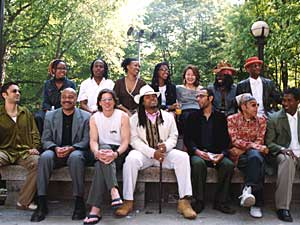|
Audio
Photos
Resources
Respond to this story
|
Musicians group fights racial stereotypes
December 3, 2004
 |
| Burnt Sugar is an improvisational orchestra of musicians who bring a diverse range of influences and styles to the stage. Greg Tate (center front row) is the conductor. (Photo by Ginny Suss) |
St. Paul, Minn. — The color of a person's skin doesn't necessarily determine what type of music they like. But black musicians like Greg Tate say stereotypes are pervasive in the music industry. He says they determine what kind of music hits the airwaves.
 | |||
"You almost heard this kind of ludicrous idea from the white side that rock and roll was this white form of music that only white people could play competently," says Tate. "Behind all that was just the notion it was just easier to market conventional R&B to black kids, and conventional rock and roll to white kids."
Tate is also a New York-based music journalist, author and co-founder of the Black Rock Coalition. The group, formed in 1985, is a collection of artists and music fans devoted to breaking down the barriers that they say limit black artists. Tate says the Black Rock Coalition started producing and promoting concerts and albums by its members.
"Things really took off around 1989 when Living Colour got signed to Epic (Records)," Tate says.
Living Colour guitarist Vernon Reid is another coalition co-founder. Living Colour got a lot of airplay on hard rock radio stations in the late '80s and early '90s. Much of the press the band received focused on their race. People were surprised black people could play that kind of music.
Greg Tate wasn't.
 | |||
"It's reflective of how much racism is about ignorance, you know what I mean?" says Tate. "People just don't know because they're not exposed. And if you're getting all your information from mass media, from cable TV, about what anything is, it's going to be wafer-thin."
The Black Rock Coalition doesn't have a high-profile champion like Living Colour at the moment. But, with the help of the Walker Art Center, Tate and his band Burnt Sugar are bringing their brand of genre-busting music to the Twin Cities Dec. 4-5.
As Tate says, music industry executives may be surprised to learn that like black musicians, black listeners aren't just sticking with the traditional fare.
Students at Musictech College in St. Paul are studying to be professional studio engineers, musicians and producers. Their goal is to shape the music put out for public consumption.
"As far as African-Americans and what they listen to, I don't know," says Cash Ahua, 22. She's studying studio production and is an international student from Nigeria.
|
There's all kinds of different kinds of feelings that come with the different kinds of music. ... people are putting a wall up by sticking to just one kind of music.
- Azziz House, music student |
"There's a lot of hip hop there. That's kind of innate, you know, we're driven by the beat. That's what that music is about, and the message," says Ahua. "So that's there, and we'll listen to that. However I think more people are exploring different genres."
Ahua says for the most part she listens to neo-soul artists like Erykah Badu and Jill Scott. But she says her record collection also includes some avant garde sounds and the pop-punk of Avril Lavigne. Ahua says she thinks musical tastes are not so much determined by race, but by pop culture and the music a person is exposed to early in life.
Apparently, musical tastes are also influenced by studying at a music-based school.
Azziz House -- or just Z -- is a studio engineering major originally from Chicago. He says through his studies he's learned to appreciate the lyrical intensity of industrial metal bands like Tool and Nine Inch Nails. House says he primarily listens to hip hop. But he says musical variety is the spice of life.
"There's all kinds of different kinds of feelings that come with the different kinds of music," says House. "And I do feel like people are putting a wall up, or putting a ceiling up for themselves, by sticking to just one kind of music."
Both students say popular music is too formulaic. But they are opimistic. The students believe that musical tastes are becoming more sophisticated and listeners are more willing to explore other styles.
|
News Headlines
|
Related Subjects
|
